Back to all articles
New SARE Research Project Exploring Biochar from Biosolids

https://www.mdpi.com/2227-9717/10/11/2187
Biochar from Biosolids and Source Separated Human Urine: Soil Health Impacts and Farmer Perspectives
We are exploring combining source separated human urine with biosolids-derived biochar and biomass biochar. We will be investigating the impacts of these amendments on soil health and farmer perspectives. We are interested in researching biochar made from biosolids and urine fertilizer because:
- Research has shown that pyrolyzing biosolids has the potential to produce biochar reduces many organic contaminants (including PFAS) and immobilizes heavy metals.
- Filtering urine or similar human waste streams through biochar can further immobilize contaminants, such as the residual pharmaceuticals in urine.
- The nutrients in urine can then be absorbed in biochar for use on farms as a value-added product.
Producing biochar from biosolids offers an opportunity to convert a waste into a value-added product that can increase soil organic matter, help mitigate climate change, and improve crop production, while reducing the need for additional expensive and greenhouse-gas producing inputs.
We are embarking on the first of a three-year field experiment with corn, measuring the effect of these amendments on soil health, crop yield, and nutrient leaching, compared to currently-used conventional and organic amendments. We have two study sites in Vermont and Long Island.
We are also conducting social research to understand farmer perceptions of biosolids biochar, a novel amendment, and determine what further research or best practices may be required for this product to be adopted by farmers in the Northeast.
This project is a partnership between the Rich Earth Institute, Cornell University, Cornell Extension, and University of Michigan.


